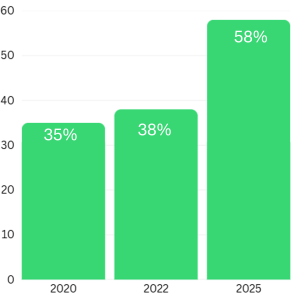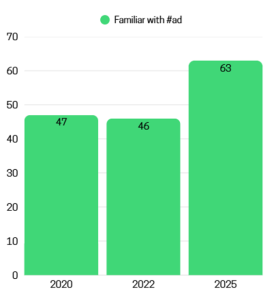



More than half of Irish consumers (58%) check influencers’ posts before making personal shopping decisions – and of these, almost one in three (29%) do so at least once a week, according to a recent survey ASA carried out.
Research also found that nearly one in five people (19%) now trust online advertising more than TV, radio, print, or outdoor advertising. This marks a significant increase since 2022, when fewer than one in ten (9%) said they placed greater trust in online advertising. Nearly one in four (23%) also say they trust influencers’ posts more than advertisements from the brand themselves.
When prompted, more than six in ten social media users (63%) say they are familiar with the label #ad – a significant increase from 2022, when just under half (46%) recognised it. Women and those under 45 remain more likely to recognise hashtags used to signal advertising content.
In 2022, nearly seven in ten people (67%) said they were most bothered by influencers editing their photos; however, this figure has since dropped to just under four in ten (39%). Today, Irish consumers are most irritated by influencers who misrepresent real life, with more than half (54%) saying that inauthentic content is their biggest annoyance.
Our latest research highlights just how influential online content creators have become in shaping consumer behaviour. More than half of Irish consumers now check influencers’ posts before making personal shopping decisions, and younger audiences, particularly those under 35, are particularly engaged. At the same time, trust in online advertising is growing rapidly, and awareness of advertising labels like #ad is improving, reflecting a more informed and aware audience.
While this presents exciting opportunities for brands and creators, it also underscores the importance of authenticity and transparency across the industry. Over half of consumers say that influencers who misrepresent real life are their biggest annoyance. At the Advertising Standards Authority, we are committed to promoting honest and trustworthy advertising and we will continue to support consumers, influencers and brands to navigate this evolving digital landscape with confidence and trustOrla Twomey, ASA Chief Executive
This research was revealed at our recent webinar called ‘The Business of Influencing’ which explored the professional and regulatory aspects of content creation, including tax reporting requirements for influencers – particularly around gifts and non-monetary compensation – as well as strategies for building a personal brand and effectively collaborating with companies and brands.
Joining Orla Twomey, ASA, for a panel discussion, hosted by Breda Brown, Co-Founder and Communications Director at Unique Media, were Justin Walsh, Principal Officer, Revenue Commissioners, and Sarah Jane Staunton, Campaign and Social Media Manager, The Collaborations Agency.
- Justin outlined the tax reporting requirements for Irish influencers and content creators, highlighting what they need to know to stay compliant. He explained that non-monetary benefits, such as free holiday stays, make-up products received in exchange for tagging brands, free branded clothing, and the use of cars provided for promotional purposes, are all considered taxable income.
- Sarah Jane discussed how influencers and content creators can break into an increasingly competitive industry and why building a trustworthy personal brand is essential. She highlighted the growing importance of authenticity, the shift in brand values in recent years, and the fact that engagement rate and reach now matter more than follower count did in the past.
To recording of the webinar can be viewed here.
This new research follows a series of strategic partnerships with key state agencies and other regulators, aimed at further strengthening the Advertising Standards Authority’s role as a leading voice of authority, trust, and influence within the advertising industry.